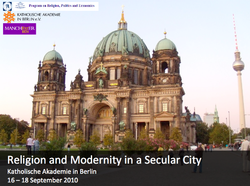 Registration is now open for the Religion and Modernity in a Secular City postgraduate conference, which will take place this coming 16-18 September at the Katholische Akademie in Berlin. The keynote speaker will be Professor Graham Ward, who will also engage in a public panel discussion with Dr. Ataullah Siddiqui of the Markfield Institute of Higher Education, and Professor Rolf Schieder of Humbolt University.
Registration is now open for the Religion and Modernity in a Secular City postgraduate conference, which will take place this coming 16-18 September at the Katholische Akademie in Berlin. The keynote speaker will be Professor Graham Ward, who will also engage in a public panel discussion with Dr. Ataullah Siddiqui of the Markfield Institute of Higher Education, and Professor Rolf Schieder of Humbolt University.
The language of the conference will be English, and the conference will take place in the centre of Berlin at the Katholische Akademie.
The registration form can be downloaded by clicking here, and the official programme for the conference can be downloaded by clicking here. The conference fee is €60 which includes lunch from Thursday to Saturday. Accommodation can also be booked at the conference venue through the registration form, however spaces are limited so do register soon. Please send your registration form via mail, email or fax to:
Dr. Martin Knechtges (Religion and Modernity in a Secular City)
Katholische Akademie in Berlin e.V.
Hannoversche Str. 5
10115 Berlin
Telephone: +49 (030) 28 30 95 151
Fax: +49 (030) 28 30 95 147
knechtges@katholische-akademie-berlin.de
For any other questions about the conference, do contact the organisers at the following addresses:
- Martin Knechtges: knechtges@katholische-akademie-berlin.de
- Kyle Gingerich Hiebert: kyle.gingerichhiebert@postgrad.manchester.ac.uk
The conference is being organized by the K. Akademie in conjunction with the Centre for Religion and Political Culture at the University of Manchester, and the Program on Religion, Politics and Economics at Humboldt University. Further details can be found through the Katholische website by clicking here. The following is an abstract on the conference theme:
Writing from Vichy, France in early 1940, Walter Benjamin articulated what many theologians secretly feared in his Über den Begriff der Geschichte by portraying theology as the hunchback that must keep out of sight. However, Slavoj Žižek has recently suggested that it is time to reverse Benjamin’s first thesis on the philosophy of history: “The puppet called ‘theology’ is to win all the time.” This startling reversal reveals that the extent to which Enlightenment secularization imagined it could map the rational world onto a manipulable grid, manifested in the global spread of political, economic and social structures that have attempted to inscribe the sacred within a strictly private sphere, is increasingly being called into question by the continuing public presence of political theologies. However, the question of what this new visibility of religion might mean in the context of the supposedly secular city remains less than clear.